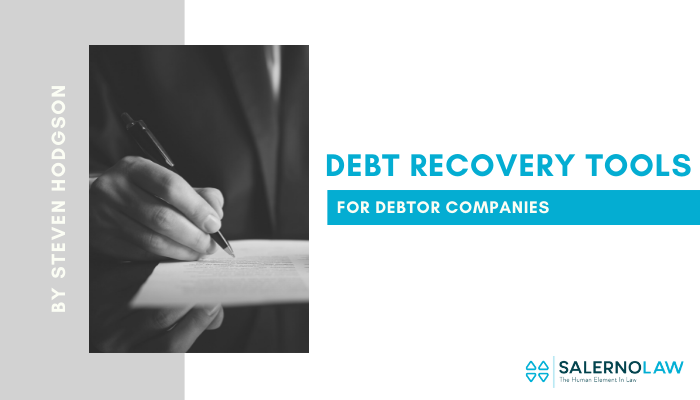Debt Recovery Tools for Debtor Companies
There is an unwritten rule in business that if a debtor is 60 days overdue on your invoice, then you can kiss that money goodbye because there is very little chance that it will ever be repaid, which can see a huge loss for you or your company.
Companies often walk a fine line when juggling finances to stay afloat and try to rely on goodwill when dealing with creditors to delay paying on time for goods sold or services rendered. But when all that goodwill is spent and a debt becomes overdue, creditors should be aware of the options that are available to them when dealing with debtor companies.
Picking up the Phone
If you still have a good working relationship with the debtor company, and you want to keep it that way, the first port of call will usually be picking up the phone to have a frank discussion with them to try to get to the bottom of the delay, sort out payment, and determine how both parties can move forward together amicably.
Sending a Legal Letter of Demand
Failing this or if the business relationship with the debtor company is not a priority, a creditor could engage a lawyer to send the debtor company a hard-hitting letter demanding repayment or proposing a compromise of the debt while also subtly suggesting what will happen if the matter is not settled in a suitable timeframe.
In some cases, well-worded correspondence on a scary legal letterhead will be all that is needed to encourage a resolution as opposed to a creditor taking it upon themselves and sending an impassioned but deranged e-mail laced with vulgarities and baseless threats.
Engaging a Debt Collector
Another option would be to engage a debt collection agency to pursue the debt on your behalf. This can be an effective way to recover an outstanding debt by outsourcing it to a reputable agency that knows how to persuade and pressure debtors, or otherwise, simply hound them into submission.
The issue with this option is that debt collectors (perhaps unfairly) have a bad reputation that can lead debtor companies avoiding them like the plague drastically reducing the collection agency’s effectiveness. Nevertheless, in many cases, this can be an easy, hands-off approach to debt recovery.
Commencing Court Proceedings
Engaging a law firm to prepare and file court documents on your behalf to sue a debtor company is probably the most traditional way to pursue a debt. Naturally, this option can be costly, but it may be the most surefire way to demonstrate to the debtor company just how serious you are about recovering the debt and how far you will go to do it.
As for timeframes, if the matter were to go all the way to a final hearing, it could take several months or even years, which does not really help in the short term when you need the monies repaid the most. However, proceedings can settle at any point in time out of court, especially if it is an open and shut case, so it can be a good investment to institute court proceedings and then efficiently negotiate a settlement with the debtor company.
Importantly, if the debt is less than $5,000-$10,000, this will unlikely be the most cost-effective option to use, especially if the court proceedings become protracted.
Unsurprisingly, there are pros and cons to this option, but if a creditor is owed a significant amount by a debtor company, then it could be prudent to go on the front foot and show them how serious you are by suing them.
Sending a Statutory Demand
A lesser-known option that may be the most effective is a statutory demand. This handy debt recovery mechanism under the Corporations Act 2001 (Cth) allows a creditor to send what is essentially a letter enclosing a notice to a debtor company demanding payment of a debt that is more than $2,000 within 21 days. Should the debtor not repay the debt or agree to a suitable repayment plan within this timeframe, then it will be presumed that they are insolvent, and the creditor can apply to the courts for the debtor company to be wound up.
Preparing the statutory demand and going through the winding up process can be quite tricky and costly, but you will often find that the threat of being wound up by a genuine creditor is enough to make even the most difficult debtor company give in and pay your outstanding invoices.
When to Pursue a Debtor Company
As these debts would usually be listed on your balance sheet under accounts receivables as a current asset, old debts can easily breed confusion and uncertainty when planning for the future. Accordingly, whether your invoice is payable within 7 days or 28 days, once it becomes (almost) past due you should be considering one of the options listed above because the debtor company’s delay is costing you time and money and creating uncertainty for your plans, in addition to the fact that the longer the debt goes unpaid, the less likely it is that it will be repaid.
Which is Best for You?
It is important to note that none of these options guarantee repayment, but taking timely action significantly increases the chances of that pesky debtor company repaying you or your company without it unduly affecting you.
At the end of the day, business is business, and you need to look out for number one. So, if you or your company are having difficulty with your accounts receivables because of debtor companies, consider contacting Salerno Law to discuss your options with our Commercial Disputes Team.
Contact Steven Hodgson for more information about debt recovery.
Steven Hodgson | Senior Lawyer
T: +61 (7) 5575 8011 | E: s.hodgson@salernolaw.com.au




Leave A Comment